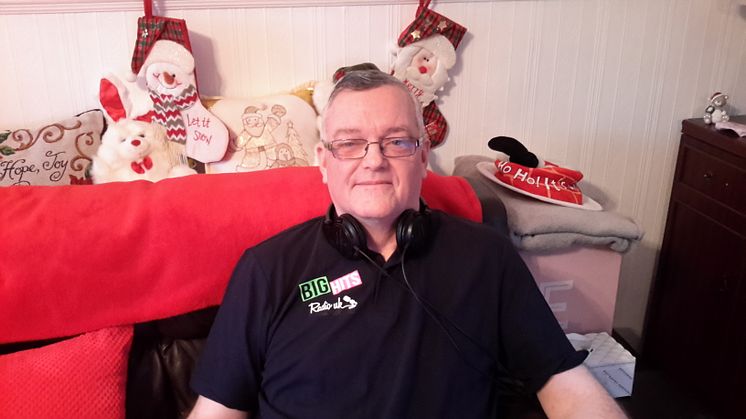
Press release -
Belfast man says hope after stroke is vital to recovery
- 30% of stroke survivors under the age of 60 say having a stroke cost them their job, one in ten say it caused their relationship to end and 6% even lost their home
- Over half of stroke survivors say they have never emotionally recovered from their stroke
- But a quarter felt first signs of hope less than a week after having a stroke – although one in seven have not felt any hope since it happened
- Stroke Association calls for those who can to donate to give more survivors hope after a stroke
The practical, emotional and physical impact of having a stroke has been laid bare by a new survey of 3,500 stroke survivors, released today. The research, conducted by the Stroke Association ahead of World Stroke Day (29 October), is part of a renewed call for vital funds to help the charity give more survivors hope after their stroke and help them to rebuild their lives.
The impact on survivors under 60
The research reveals that 30% of those under the age of 60 who survived a stroke say it directly led to them losing their job whilst 6% say it led to them losing their home.
Furthermore, a quarter (23%) say it had a negative impact on their relationship with their partner, with one in ten (9%) saying it led to their relationship ending. It is not only relationships with partners that are affected – a fifth (20%) say they lost friends as a result of having a stroke.
Younger survivors more severely impacted
The research reveals that the emotional impact of a stroke can impact younger survivors more severely. Amongst those under the age of 50, six in ten (61%) say that they’ve never emotionally recovered from the impact of their stroke. This compares to 44% for those over the age of 50.
This is despite a similar number of younger stroke survivors under the age of 50 (50%) and over the age of 50 (52%) saying they have not physically recovered from their stroke.
The importance of hope
The research shows the importance and transformative power of feeling hope after having a stroke. Three quarters (76%) say that hope played an important or critical part in their recovery.
But for many, it was not a quick process. Whilst a quarter (25%) say they began to feel hope less than a week after their stroke, for over a third (35%) it took more than a year to experience what they felt was the first sign of hope. Meanwhile 13% say they have never felt hopeful since they had their stroke – demonstrating how strokes can impact survivors differently.
The Stroke Association helps people to find the hope they need to rebuild their lives through specialist services, including a Helpline, peer support service, support groups and Support Coordinators.
Jim McDowell is 64 and from Belfast. Jim had a stroke in January 2020 whilst at home alone watching football.
Jim remembers his phone alerting him to an incoming text. When he went to check it, he was unable to move his left arm. After several failed attempts to stand up from the sofa, Jim knew there was something seriously wrong but it wasn’t until the next morning when Jim finally asked his brother to take him to the Royal Victoria Hospital, Belfast, where a brain scan confirmed that Jim had had a stroke.
Jim says: “I now know that I should’ve phoned 999 immediately when I felt something was wrong but at the time you don’t really know what’s happening. And my face didn’t droop like you see on the FAST test TV adverts.”
“In March, when the Covid lockdown started and over those first few months, I know I wasn’t getting the exercise and rehab I needed. With support from the Stroke Association I realised that I had to push myself to get back to being me. Before my stroke I was a keen bowler and loved getting down the local bowling club for a game. The biggest moment of hope for me after my stroke was towards the summer in 2020 when the Covid restrictions eased enough to let my local bowling club open. That first time I went to play a game of bowls I was very apprehensive as, with my balance, I was afraid of falling. My first game after my stroke wasn’t good. I joked that even my bowls were social distancing as there was at least two metres between them and the jack. Definitely the worst bowls I’d ever played but I didn’t care. I enjoyed it. I was getting back out there and talking to people again which was so very important to me. That really boosted my confidence. It was feeling that I was getting back to being me a bit more every time I played.”
“Before my stroke I had been hosting a weekly show on the internet radio station, Big Hits Radio UK. I’m so glad to still be able to do the show and it gave me hope and kept me going throughout lockdown in those first few months after my stroke.”
Jim says: “That day in January 2020 I believe my body spoke to me and told me to slow down. People might look at me now and think there’s nothing wrong with me but I know I’m not the same. My memory’s not as good and my balance isn’t great as I’ve got weakness on my left side. I’m conscious there’s something wrong with my hand now as some times, when I’m tired or not concentrating, whatever I’m holding can just fall from my grasp. But I know I’ve recovered well and there’s so many people worse off. The Stroke Association has been there for me and my family. They’ve helped and supported me to understand what’s happening with me and I know I’m not in this alone. Hope is everything after a stroke. I needed to know I would recover and even though I’m still recovering, I’m improving day by day.”
Big and small moments of hope
The research found that it can be both big and small moments of hope that are important. When asked what gave them their first moment of hope after a stroke, 17% said it was being able to use their affected side for the first time and 11% said it was being able to speak again. However, 15% said it was being able to complete a small every day task such as making a cup of tea.
Reevaluating what is important after a stroke
The impact of a stroke leads many to reevaluate what is important in life. Over half (56%) say having a stroke made them appreciate their life more, 43% say it made them appreciate their family more and 41% say it made them appreciate the importance of looking after their health.
Juliet Bouverie, Chief Executive of the Stroke Association said: “Every five minutes, someone in the UK will have a stroke and in a flash, their life is changed. Two thirds of people who survive a stroke find themselves living with a disability. The physical impact of a stroke is severe, but for many, the emotional aspects of coming to terms with having a stroke are just as significant. As the research makes clear, finding hope is a crucial part of the recovery process. Without it, recovery can seem impossible.
“At the Stroke Association, we support and help people to find this hope, and rebuild their lives. But with 1.3m people and rising in the UK now living with the effects of a stroke, our services have never been more stretched. We urgently require the support of the public to help us continue to support stroke survivors to rebuild their lives.”
The Stroke Association is asking those who can to donate today so that it can reach more stroke survivors and give them the specialist support they need to find hope and move forward with their recovery. Visit stroke.org.uk/hopeafterstroke
ENDS
Topics
Categories
- Stroke strikes every five minutes in the UK and it changes lives in an instant.
- The Stroke Association is a charity working across the UK to support people to rebuild their lives after stroke. We believe that everyone deserves to live the best life they can after stroke. From local support services and groups, to online information and support, anyone affected by stroke can visit stroke.org.uk or call our dedicated Stroke Helpline on 0303 3033 100 to find out about support available locally.
- Our specialist support, research and campaigning are only possible with the courage and determination of the stroke community and the generosity of our supporters. With more donations and support, we can help rebuild even more lives.
- You can follow us on Twitter, Facebook and Instagram.










